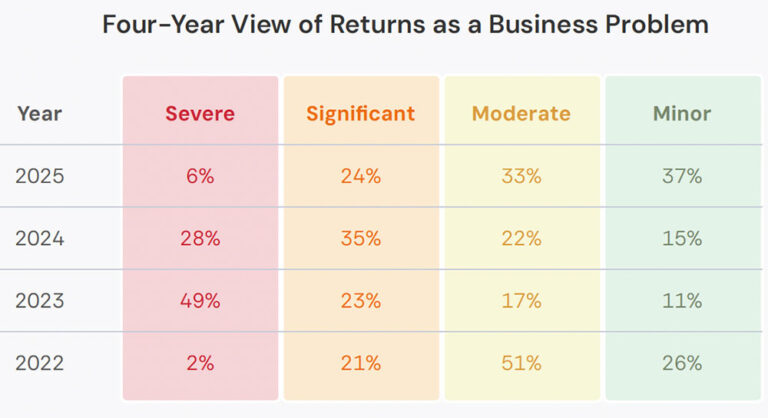Retailers are under pressure to deliver fast, personalized customer experiences (CX) at scale. Many are exploring generative AI (GenAI), but few have successfully implemented it in ways that enhance service and empower frontline teams.
Retailers face a pivotal moment, with GenAI offering a path to transform customer experience and operational efficiency. However, the journey from exploration to successful implementation is not without its hurdles.
Business Process Outsourcing firm TaskUs is helping global brands do exactly that. It provides a pathway to overcome key factors hindering GenAI’s adoption.
Data and integration gaps, talent shortages, trust and governance concerns, and challenges in defining and measuring ROI hinder businesses, according to Joe Anderson, senior director and head of CX and digital transformation at TaskUs.
“This technology changes overnight. Right now, agentic AI is emerging as a transformational tool that can enhance experiences and create notable efficiencies,” he told the E-Commerce Times. “It can act on its own within defined limits and complete transactions, like processing a return and issuing a refund.”
Challenges to Scaling GenAI in Retail
Table of Contents
- 1 Challenges to Scaling GenAI in Retail
- 2 Breaking Down Barriers to GenAI Success
- 2.1 E-Commerce Times: How does TaskUs integrate GenAI into existing retail tech stacks without causing significant disruption or requiring a complete system overhaul?
- 2.2 How does TaskUs make AI integration work?
- 2.3 How do the GenAI tools balance efficiency gains and better human-centric CX?
- 2.4 Can you provide an example of how a retail client is using your PromptAI to generate new revenue streams or drive customer loyalty?
- 2.5 What role does conversational AI play in your solution?
- 2.6 What emerging technologies or trends in AI, such as multimodal AI or autonomous AI agents, do you see as the next frontier for retail CX?
The adoption path for GenAI in retail typically begins with high expectations and small-scale experiments, focusing on customer-facing chatbots or internal tools for content creation. This initial trial phase reflects a desire to gain a competitive edge and enhance specific business functions.
As these startup efforts show promise, retailers move toward scaling these solutions across the organization. However, few have reached this stage of widespread, impactful adoption.
The stumbling point is the vast amounts of high-quality, clean, and unified data GenAI needs to function effectively. Retailers grapple with fragmented data across disparate systems, making it challenging to create a single, comprehensive customer view that is accurate, relevant, and unbiased.
Implementing and managing GenAI solutions requires specialized skills that are often in short supply. Data scientists, AI engineers, and prompt managers are not available in sufficient numbers.
Even partner organizations need to upskill their existing workforce to use and interact with the new technology effectively. Hurdles do not end there. Data privacy, security, and the potential for AI models to produce biased or unethical content raise additional concerns that only robust governance frameworks can mitigate. This further slows down the deployment process.
Breaking Down Barriers to GenAI Success
We asked Anderson to explore the expertise that TaskUs brings to helping companies cope with these adoption and early usage issues. For many of his firm’s clients, the solutions involve creating a corporate culture that prevents silos.

Clients often use more than one of the company’s services together, such as customer experience and financial crime and compliance. A collaborative approach, combined with tightly defined processes and clear communication, ensures that these services work seamlessly, regardless of the industry.
“In retail, we are known for turning real-time data labeling into actionable insights. Our client, Badger Technologies, partnered with TaskUs to enhance the speed, accuracy, and quality of AI model training for their in-store robots,” Anderson offered.
Providing real-time data labeling, flexible staffing, and optimized workflows helped Badger scale operations rapidly, deliver higher-quality outputs faster, and drive improved safety and sales decisions for its retail customers.
TaskUs offers expertise in data collection and enrichment, synthetic data generation, and data annotation. Its AI services provide high-quality training data and evaluation support to help create safe, reliable models that drive results.
We spoke further with Anderson about how TaskUs guides retailers through the challenges of integrating generative AI without overhauling existing systems.
E-Commerce Times: How does TaskUs integrate GenAI into existing retail tech stacks without causing significant disruption or requiring a complete system overhaul?
Joe Anderson: We begin with our deep knowledge of the retail industry and its workflows. We first determine where AI is best applied and where it has the greatest impact.
For example, we recommend choosing high-volume workstreams but starting with a small portion of the workload. Gradually scaling up eliminates disruption and allows the AI system to learn, fine-tune, and adapt to existing workflows. The result is not only smoother integration but also brings a clear return on investment as AI-powered workflows continue to scale.
How does TaskUs make AI integration work?
Anderson: Our experts collaborate with clients to integrate our GenAI tools seamlessly alongside their existing legacy systems, delivering targeted, workflow-specific implementations. API-level integration of GenAI in areas like CRM, chat, and knowledge bases supplements rather than replaces existing systems.
It’s also crucial to train everyone who interacts with the AI tools. People won’t adopt new technology if they don’t trust or feel comfortable using it.
How do the GenAI tools balance efficiency gains and better human-centric CX?
Anderson: AI automates high-volume, repetitive tasks, but humans always remain in the loop and take the lead in handling emotionally complex or judgment-intensive situations. Our proprietary AssistAI and PromptAI augment our teammates’ capabilities.
The tools provide real-time suggestions during customer interactions, enabling agents to be more confident and empathetic. Nuanced judgment and escalations go to the most experienced frontline teammates. This model amplifies human expertise rather than replacing it.
Can you provide an example of how a retail client is using your PromptAI to generate new revenue streams or drive customer loyalty?
Anderson: A leading sporting goods retailer in Latin America used it to meet surging chat volumes as it expanded regionally. PromptAI delivered context-aware, real-time suggestions that reduced chat handle time by 30 seconds and improved quality assurance.
This enabled frontline teammates to resolve issues faster, increase Net Promoter Scores, and free agents to prioritize upselling and loyalty-building conversations. That turned CX from a cost center into a growth engine.
PromptAI and our other proprietary tools, like CallAI, AssistAI, and AuthorAI, enhance interactions across formats and channels in all the industries we serve. These tools lead to results such as decreased average handle time (AHT), fewer human errors, increased accuracy and consistency, and, ultimately, higher customer satisfaction scores (CSAT).
What role does conversational AI play in your solution?
Anderson: AI-enabled interactions are a critical part of how TaskUs helps brands deliver faster, more innovative, and more personalized experiences. Unlike traditional rules-based chatbots that follow rigid scripts, our AI solutions can understand intent, remember context, and adapt dynamically to user interactions. This creates interactions that feel natural and relevant, rather than transactional.
More importantly, TaskUs blends AI with human talent to strike the right balance between speed and empathy. This hybrid approach not only improves efficiency but also ensures that customers always feel heard and supported.
What emerging technologies or trends in AI, such as multimodal AI or autonomous AI agents, do you see as the next frontier for retail CX?
Anderson: We are seeing an increasing deployment of Agentic AI that can act on a customer’s behalf. We help clients manage the entire Agentic AI implementation process, from strategy and training to ongoing management and change control. We see it as an AI transformation and take a holistic approach that combines our CX expertise with AI technology.





